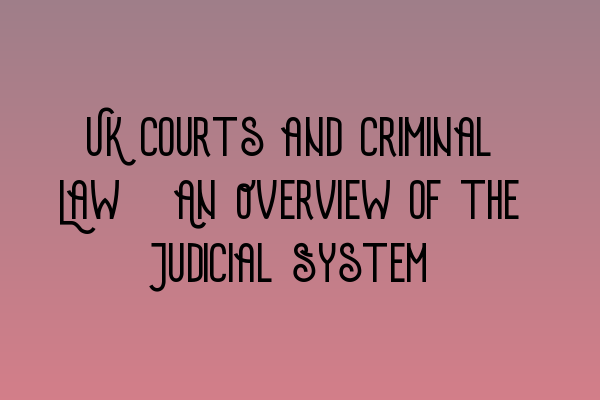UK Courts and Criminal Law: An Overview of the Judicial System
Welcome to our blog post, where we provide you with a comprehensive overview of the judicial system in the UK and how it relates to criminal law. Understanding the UK courts and criminal law is crucial for any aspiring legal professional or anyone who wants to have a better understanding of the justice system. So, let’s dive right in!
The UK Judicial System
The UK judicial system is divided into different courts, each with its own jurisdiction and purpose. These courts ensure the fair administration of justice and uphold the rule of law.
At the top of the hierarchy is the Supreme Court, which is the final court of appeal in the UK. Its decisions are binding on all lower courts, providing guidance on legal principles and setting precedents. It ensures uniformity in legal interpretation and helps maintain consistency in judgments.
Beneath the Supreme Court, there are two main types of courts: civil and criminal. In this article, we will focus specifically on the criminal courts.
The Criminal Courts
The criminal courts in the UK are responsible for hearing cases involving criminal offenses, such as theft, assault, and murder. They play a crucial role in ensuring that the accused receive a fair trial and justice is served.
The criminal courts are further divided into three main tiers: Magistrates’ Courts, Crown Courts, and the Court of Appeal.
1. Magistrates’ Courts
Magistrates’ Courts are the lowest level of courts in the UK criminal justice system. They deal with less serious criminal offenses and act as the first point of contact for most criminal cases.
The majority of cases, around 95%, are heard in Magistrates’ Courts. They are presided over by a bench of three lay magistrates or a district judge, who decide on guilt or innocence and determine sentences for minor offenses.
If the accused pleads guilty, the Magistrates’ Court can sentence them on the spot. However, if they plead not guilty, the case may be transferred to the Crown Court for a more in-depth trial.
For more information on how Magistrates’ Courts function and what to expect, feel free to check out our SQE 1 Practice Mocks FLK1 FLK2 article.
2. Crown Courts
Crown Courts are the next tier up from Magistrates’ Courts and handle more serious criminal cases. They have the power to deal with indictable offenses and can also hear cases transferred from Magistrates’ Courts for more extensive trials.
Trials in Crown Courts are heard by a judge and a 12-member jury. The judge ensures that proceedings are fair and follows the law, while the jury determines guilt or innocence based on the evidence presented.
If the accused is found guilty, the Crown Court will pass sentence based on the seriousness of the offense and other relevant factors.
If you’re interested in exploring sample criminal law scenarios that may be heard in Crown Courts, our SQE 1 Practice Exam Questions article will provide you with valuable insights.
3. Court of Appeal
The Court of Appeal is the highest court in the UK’s criminal justice system. It handles appeals against convictions and sentences from both Magistrates’ and Crown Courts.
The Court of Appeal is divided into two divisions: the Criminal Division and the Civil Division. The Criminal Division focuses solely on hearing and determining criminal appeals.
If you want to learn more about the criminal appeals process and how the Court of Appeal functions, we recommend checking out our SRA SQE Exam Dates article.
Conclusion
Understanding the UK courts and criminal law system is essential if you’re pursuing a career in law or simply want to have a better grasp of how justice is administered in the country. We hope this overview has provided you with valuable insights into the judicial structure and processes involved in UK criminal law.
If you’re looking for further resources or seeking preparation courses to enhance your knowledge of criminal law, don’t hesitate to explore our SQE 2 Preparation Courses and SQE 1 Preparation Courses.
Thank you for taking the time to read this blog post. We hope it has increased your understanding and awareness of the UK courts and criminal law. If you have any further questions or need assistance, please don’t hesitate to reach out to us at SQE Criminal Law & Practice Law UK.
